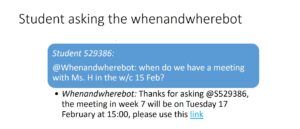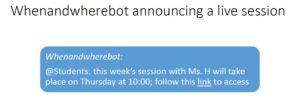A bot to help the teacher?
Thinking about a ‘teacherbot’ like the one that was described in Bayne’s article (Bayne 2015), has made me realize there are many different angles that need to be looked at. What would the use of such a bot mean for the job of the teacher? Would this type of educational technology be seen as contact? I look at this in more detail below by discussing the idea I have for a bot, how it can reshape the teachers’ job, if it can be seen as educational contact and what the ethical implications could be.
The bot I have in mind would be a ‘where and when’ bot, which could answer basic questions the students have about their next live session in an assumed digital course. The bot could be programmed to answer these questions if it has been fed the information of when and where live sessions would occur. It could also send out a reminder of any live sessions that have been planned on a weekly basis. This would help the teacher and save time in that the information has to be provided by the teacher only once and then it could be assimilated by the bot whenever the students ask for it.


Using a bot like the one described above could reshape the teachers’ job in some respects; the sessions would have to be planned in advance and the links for the sessions created, probably at the start of the semester. It would therefore make it necessary for this to be planned in advance by the teacher. Planning sessions this far in advance would help the teacher structure the semester, based around the live sessions. It would also allow the teacher to spend mental energy on other things, if there is no need to answer a repetitive question like this one so in that sense, the teacher would be able to do the job better with a little help from technology.
Could use of a bot that answers student’s questions, be described as a form teaching? Is this a form of educational ‘contact’ as described in the Manifesto? (p 87) The traditional idea of contact in an educational setting is one of the teacher and the students, face to face in the same space. There is an argument to be made however, that contact in education can be made in a myriad of ways, like a blog for instance. The question here then would be if the whatandwhere bot does qualify as contact in this sense? The Manifesto quite clearly outlines “an asynchronous text” as an example of contact (p 89). There is a further layer to the contact in this case though; the teacher isn’t responding directly to  a question by a student, but rather through a bot that has been programmed to give the answers she has provided. I think this still qualifies as contact, as long as the programming is correctly done and there is nothing lost in translation, or programming in this case. I do think the extra layer adds complexity though, since it increases the margin for error more so than a teacher answering a text personally or being asked a question in class. The bottom line as I see it is that yes, the bot can be perceived as a slow form of contact between a teacher and a student, taking place over several weeks or months. As long as the programming of the bot has been done correctly, it will be meaningful contact. Otherwise it would be contact, but not necessarily useful or timesaving for the teacher or the student.
a question by a student, but rather through a bot that has been programmed to give the answers she has provided. I think this still qualifies as contact, as long as the programming is correctly done and there is nothing lost in translation, or programming in this case. I do think the extra layer adds complexity though, since it increases the margin for error more so than a teacher answering a text personally or being asked a question in class. The bottom line as I see it is that yes, the bot can be perceived as a slow form of contact between a teacher and a student, taking place over several weeks or months. As long as the programming of the bot has been done correctly, it will be meaningful contact. Otherwise it would be contact, but not necessarily useful or timesaving for the teacher or the student.
Technology in education can have serious ethical consequences that should be addresses a lot more, especially now that most school going children have been rushed into homeschooling. As a consequence, they have had no choice but to use the software the school requires, like Google Classroom or Teams. By letting the schools and their pupils use these programs, the companies that have created them now have access to an incredible amount of data and data is big business, as they say. I think this is an ethical nightmare scenario considering there was no real time to prepare for the move to homeschooling, meaning that there are no real guarantees that the data which is suddenly available will not be used for financial gain. Ethically speaking, I think the bot prototype I have come up with here can be seen as relatively low risk. It doesn’t gather any sensitive data apart from the student handles and contains information that is only relevant for the specific class in this course. I imagine that even the link to the live sessions will be restricted and can only be used for a specific session and only once.
In conclusion, I think a teacherbot is an interesting addition to the educational environment, it can be seen as an extension of the teacher, or a non-human teacher (Bayne 2015) who can help to make the job of the human teacher a little easier in some ways. The prototype imagined here is a simple one though and I think the more complex a teacherbot would be, the more it needs to be rigorously considered for educational value; is it really an improvement? But maybe most importantly it should be assessed for the consequences using technology in education can have.
Sian Bayne (2015) Teacherbot: interventions in automated teaching, Teaching in Higher Education, 20:4, 455-467, DOI: 10.1080/13562517.2015.1020783 (p 455-457)
Bayne, Sian, et al. The Manifesto for Teaching Online, MIT Press, 2020. ProQuest Ebook Central, https://ebookcentral.proquest.com/lib/ed/detail.action?docID=6317960.




Interesting reflections no the nature of contact here. You’ve clearly thought a lot about what is and is not ‘contact’. I do like your framing of ‘slow contact’ that is a key part of the student/ teacher relationship even if it isn’t really teaching time.
The ethical points you raise are really important but falling a bit under the radar as often the data is anonymised before the companies get their hands on it. But, there’s still an awful lot of information that can be gleamed from anonymised information that could be used to identify and target individuals. You might be interested in this short video that discusses the risks of data extraction in digital education: https://www.advance-he.ac.uk/knowledge-hub/re-thinking-delivery-models-quality-higher-education-all-provocation-two
Thanks for the video, I enjoyed watching it. At the same time, it really worries me that data and it’s use by big companies is gradually increasing and beginning to influence our everyday life, or searches in this case.
Hi Femke ,
As we’re at about the halfway stage of the course, I’m reviewing everyone’s blogs against the assessment criteria in the course handbook.
Your blog demonstrates a regular and thoughtful reflection on the course content and activities. the posts on the Manifesto statements are particularly effective in their combination of reflection on the statements in relation to your own professional context and practice. Your most recent post on teacher bots again reflects very effectively on the relationship between the concepts of concern and practice. The frequency and substance of the posts suggest that you are sustaining a consistent engagement with the course.
Your blog demonstrates an effective and critical engagement with the concepts. The posts on the teacher functions, contact-time for the bot and the posts on essentialism, instrumentalism and posthumanism are all good examples. I would encourage you to continue to ‘pick-up’ threads of concepts from previous blocks of the course and weave them into the current block and posts. This helps in generating a strong sense of coherence to your blog.
Your communication style works well for the blog as a semi-formal mode of communication. The use of multimodal elements – Wall-E being the obvious one – is great and I hope you can experiment further with different uses of audio, visual and links within your posts.
I’m finding a lot of value in your posts and am enjoying reading them and so I’m looking forward to seeing how your blog develops over the remainder of the course. Please just let me know if you have any questions about this review.
Hi Peter,
Thank you for your comments and feedback (and feed forward?) on my blog, all very useful and I will try to use it as the course progresses.